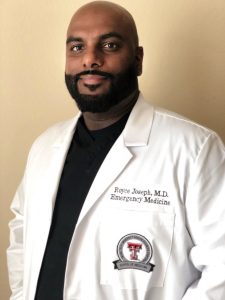Pursuing an Emergency Medicine Fellowship as a Family Medicine Physician
 Royce Joseph, MD was a family medicine resident turned emergency medicine physician through an EM Fellowship and now is a Diplomate of the American Board of Physician® Specialties (ABPS). Dr. Joseph works for Basin Emergency Physicians at Pecos County Memorial Hospital in Fort Stockton, Texas, but was once a Long Island, New York firefighter. “It was in this role that I quickly learned the importance of always being prepared for the worst situation,” he said. “When a fire alarm went off, we blindly raced off toward a potentially dangerous situation with only a limited amount of information. This required that we be prepared, at all times, to perform the tactical rescue and firefighting techniques we were trained in.”
Royce Joseph, MD was a family medicine resident turned emergency medicine physician through an EM Fellowship and now is a Diplomate of the American Board of Physician® Specialties (ABPS). Dr. Joseph works for Basin Emergency Physicians at Pecos County Memorial Hospital in Fort Stockton, Texas, but was once a Long Island, New York firefighter. “It was in this role that I quickly learned the importance of always being prepared for the worst situation,” he said. “When a fire alarm went off, we blindly raced off toward a potentially dangerous situation with only a limited amount of information. This required that we be prepared, at all times, to perform the tactical rescue and firefighting techniques we were trained in.”
After graduating from medical school, he chose a family medicine residency because of the wide-open career prospects. “I did not want to limit my scope of practice,” he said, and the residency’s rigorous training gave him the ability to seamlessly deliver both acute and chronic care in the adult, pediatric, neonatal, geriatric, and pregnant populations across a variety of environments.
As Dr. Joseph did more rotations in the emergency department, he saw parallels to his firefighting experience in the ability of ED physicians to quickly amp up their response when complicated challenges were brought in through the ambulance bay doors. “Sure, the chief complaint may be a ‘sore throat’ and the diagnosis may be as benign as ‘strep throat,’” he said, “but I wanted to be trained and ready for the ‘sore throat’ patient that was actually suffering from angioedema that resulted in a compromised airway.” He found that being the go-to person in a patient’s most desperate time of need was the ultimate privilege.
Having completed his family medicine residency, Dr. Joseph felt prepared to take care of both the office patient and the hospitalized patient. He knew, however, that the ER was a different beast and it required a mental shift. He knew patients would present with limited amounts of information and only a small time window in which to take action. He knew he would need to get better at managing multiple sick patients at once, endure frequent interruptions, manage patient flow, and be ready for the potential crashing trauma patient bursting through the ambulance bay doors.
Dr. Joseph decided to pursue a fellowship in emergency medicine and chose Texas Tech University. Being a Level 2 Trauma Center and having a strong relationship with the local fire/air rescue departments were a major factor in his decision. With a passionate faculty, robust simulation center, an integrated ultrasound course, fire/helicopter ride-alongs, in-house IM, FM, OB/GYN residencies, and the opportunity to teach medical, PA, nursing, and paramedic students, Texas Tech made the educational environment a top priority.
He enjoyed the transition to working in the ER. “I was able to immediately deliver life/limb saving interventions such as pressors, intubation, chest decompression, conscious sedation, fracture reduction, and thrombolytics, etc., without having to wait on a blessing from a separate specialist.”
After successfully completing the fellowship program, Dr. Joseph took the next step and sought board certification. He knew that the Board of Certification in Emergency Medicine (BCEM), a Member Board of the ABPS, offered qualified physicians with ER experience an opportunity to demonstrate their hard-earned skills and knowledge. “Proving that our emergency medicine training at Texas Tech was equal, if not superior, to the national standard was important to me,” he said. And after a rigorous application process, a comprehensive written exam, and a robust oral exam, Dr. Joseph became certified in emergency medicine through the BCEM.
“Patients rightfully demand expert care in their time of crisis, and certification by the BCEM demonstrates both mastery of the art of emergency medicine and a commitment to lifelong learning and advancement of the field,” he stated.
Here at the ABPS, we couldn’t have said it better ourselves. If you, like Dr. Joseph, are an emergency medicine fellow, and would like to stand out as a leader in the specialty, contact the ABPS today to learn about the BCEM and its eligibility requirements.






